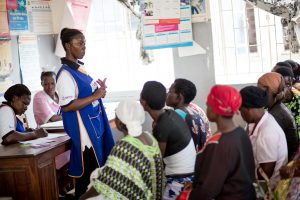How to Achieve Universal Health Coverage?…Invest in Women
Last week, world leaders adopted what United Nations Secretary-General Antonio Guterres called “the most comprehensive agreement ever reached on global health.” The declaration, agreed to at a high-level meeting of the United Nations General Assembly on 23 September, commits countries to achieve universal health coverage for their citizens by 2030. More specifically, all individuals and communities should be able to access the quality health services they need, and do so without incurring financial hardship.
This bold commitment is essential to achieving the United Nations Sustainable Development Goals (SDGs), in particular creating health and wellbeing for all and ending the AIDS epidemic. Yet, with half the world’s population unable to access essential health services according to the World Health Organization, where do countries even begin delivering on the promise of health for all?

m2m Mentor Mother gives a group health talk at Iganga Health Centre in Uganda.
mothers2mothers (m2m) believes a key solution is to invest in women. Every day, m2m witnesses the power of women—whom we employ and train as community health workers—to support other women and families to access essential health services. Paid Community Health Workers are at the heart of our model, and since we were founded 18 years ago, we have created jobs for more than 10,000 women living with HIV as Mentor Mother. Together, these Mentor Mothers have reached more than 11M women and children under age two.
Limpho Nteko is one of the women we employ in Lesotho, a mountainous country completely landlocked by South Africa. She and her team of Mentor Mothers work in the country’s critically understaffed health centres and go door to door in local communities, delivering health services, advice, and support to women and their families to help them receive the medical care they need. Mentor Mothers enhance the capacity of health centres, working alongside doctors and nurses to provide key services—helping relieve the burden on understaffed facilities and enhancing outcomes, such as adherence to treatment. In communities, they provide vital education and support women and families to access essential health services, by linking them to Mentor Mothers at clinics who support them through their health journey.

Limpho Nteko is a former m2m client and Mentor Mother in Lesotho. She now is responsible for a team of 84 Mentor Mothers in 16 health facilities as a Regional Manager.
The magic in our model is that it is peer-based: services are delivered by people from the same community as those they serve—meaning they are rooted in shared realities and experiences. Limpho knows first hand what her clients are going through, as she discovered she was living with HIV at a young age. Mentor Mothers helped her access care and stay on treatment to ensure her ongoing good health and protected her child from contracting HIV.
And Limpho is not an isolated case. Our 2018 programme evaluation reveals Mentor Mothers are improving the health and wellbeing of the clients they serve. Last year, m2m achieved virtual elimination of mother-to-child transmission of HIV for the fifth year in a row, with a transmission rate of just 1.3%, far below the UN benchmark of 5%. Our data show we are also driving access to services, retention to care, and adherence—and are playing a major role in stopping new HIV infections.
But m2m’s impact does not stop with our clients. Employment creates important economic empowerment opportunities for Mentor Mothers, helping to address gender inequalities that can make African women vulnerable to HIV and other health issues.
For Limpho, her engagement with m2m has led to a career in public health. She joined m2m as a Mentor Mother, and was promoted to Regional Manager. Today, at age 29, manages a team of 84 Mentor Mothers in 16 health facilities. With her salary she can live a comfortable life with her two children, who are both HIV-free.
m2m has been excited to see paid community health workers become a bigger part of the global discussion on achieving universal health coverage (UHC). During the 2019 World Health Assembly, the World Health Organization recognised the potential of paid community health workers to achieve universal health coverage, noting that this would create “qualified employment opportunities, in particular for women and youth, thus contributing to job creation, economic development, and gender equality.” We applaud this holistic approach to health and urge world leaders to commit to concrete actions to mobilise their female workforce in pursuit of health for all.






















